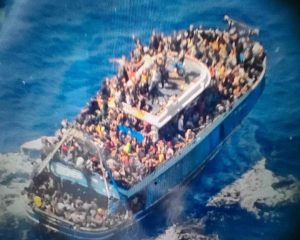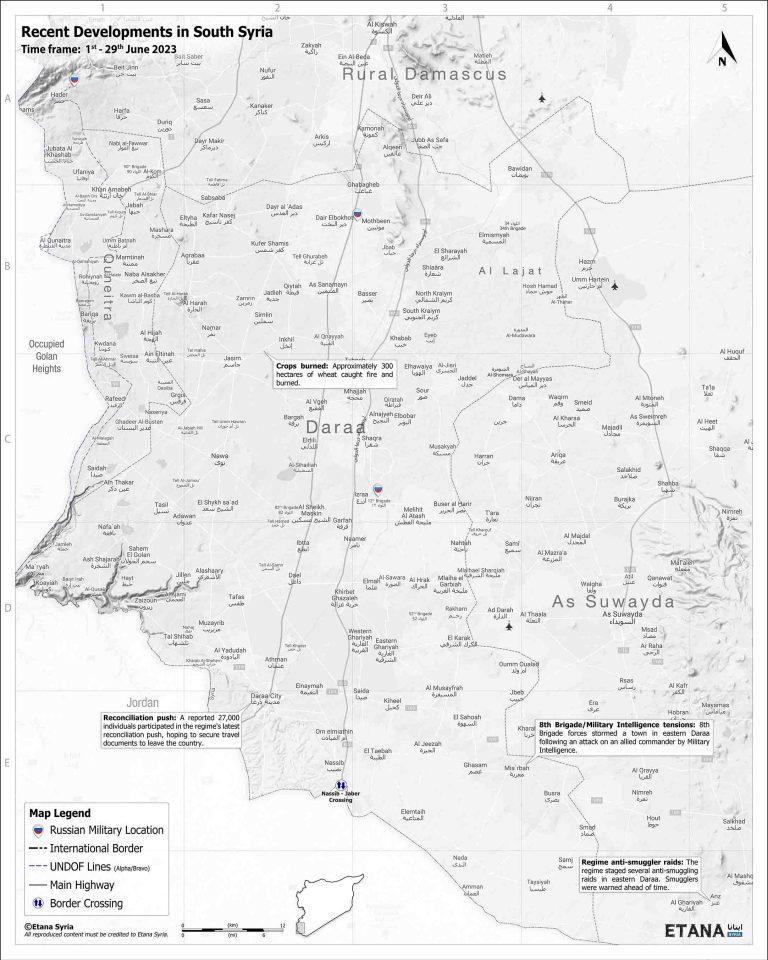This reporting period covers the month of June.
After nearly 40 days, the regime has concluded a much-hyped reconciliation drive in Daraa province, registering and settling the status of a record number of participants. The latest round of settlements reportedly involved as many as 27,000 individuals, although nearly half were conducted remotely by relatives of those living outside Syria. The reconciliation drive is a theatrical process intended to help rehabilitate the regime’s image abroad, by demonstrating a commitment to stabilizing the chaotic south-west and normalizing the status of wanted individuals. However, previous reconciliation drives have failed to remove the names of individuals from the regime’s wanted lists, and the latest effort is expected to be no different. Rather, those partaking in the settlement process are mostly doing so in hopes of securing travel documents to escape the country and deteriorating humanitarian conditions there. The desperate situation was exemplified earlier this month by the catastrophic sinking of a fishing vessel carrying 750 people in the Mediterranean Sea, an incident that left hundreds of migrants dead or missing at sea. At least 72 of the victims came from Daraa province.
Attached Map: Military Situation in South Syria
(For a high-resolution version of this map, please use the form at the bottom of the page)
Mediterranean Tragedy
In the most striking recent example of the desperation facing civilians in southern Syria and beyond, a ship carrying more than 750 people capsized in the Mediterranean Sea, leaving hundreds of migrants dead or missing at sea. At least 72 of the victims came from Daraa province.

Despite the extreme danger of this journey, the numbers of Syrians fleeing a dire humanitarian and economic situation are expected to increase, as weather conditions improve for sea crossings in the weeks and months ahead. As social conditions in south Syria continue to deteriorate, at least 2,000 young men from Daraa reached Europe in the month of May alone. Record numbers also perished along the way.
Meanwhile, more than 350 young men from Daraa have gone missing in Libya after a security campaign by Libyan authorities against networks involved in smuggling and trafficking people to the coast of Italy.
Regime Activity
The regime has concluded a recent drive for reconciliation operations in Daraa province for now, with the latest push lasting nearly 40 days and registering a record 27,000 individuals. In a testament to the enduring fear of arbitrary arrest and enforced disappearance that haunts daily life for those in regime-controlled areas, nearly half of these settlements were conducted remotely by relatives of those living outside Syria. Most of those who have come forward to partake in the process are doing so in hopes of securing travel documents to escape the country and deteriorating humanitarian conditions there, as previous rounds have failed to remove the names of individuals from the regime’s wanted lists.
In the countryside, regime security agencies continued to stage raids against drug storage warehouses in eastern Daraa, warning smugglers ahead of time, allowing them to flee, and seizing minimal narcotics in the process.
Security Developments
Tensions have mounted between the 8th Brigade and members of a narcotics smuggling group in recent weeks, amidst months of sporadic clashes and a larger campaign to crack down on smuggling activities in the area. The 8th Brigade is also clashing with Military Intelligence: in early June, 8th Brigade forces stormed eastern Daraa following an attack carried out by Military Intelligence groups on the home of an allied commander.
Daraa’s countryside is also experiencing a surge in attacks by small groups receiving funding from Hay’at Tahrir al-Sham (HTS) to target regime checkpoints and patrols.
Meanwhile, the Israeli army targeted several sites across southern Syria, including a volley of cross-border gunfire directed at the al-Shouli checkpoint on the outskirts of Ruhaynah in northern Quneitra that resulted in no casualties. Missile strikes also targeted militia sites on the road to the Damascus airport and the western Damascus countryside.
Instability in South Syria
Since 2018 south Syria has been a hotspot of instability as multiple armed actors compete for control. The deadly cycle of bloodshed between these elements–among them, opposition, regime, Iran and Hezbollah, Russia, and extremist groups–makes the south one of Syria’s most violent and complex regions today. In recent weeks, a wave of deadly attacks struck regime targets and other security elements across the south. At least eight regime troops were killed in a string of IED attacks across Daraa and Quneitra provinces. Another four individual soldiers were killed in three armed ambushes that struck regime convoys across Daraa and Quneitra.
On 12 June, unknown militants shot at a car carrying Syrian regime Interior Minister Mohammad Khaled al-Rahmoun along the Damascus-Daraa international road. Rahmoun escaped uninjured.
In addition, targeted killings have continued at elevated levels over the past month across south-west Syria. Assassinations claimed the lives of over 16 individuals, among them regime soldiers, Military Intelligence officers, former opposition leaders, 8th Brigade members and one former ISIS fighter.
Humanitarian Developments
Approximately 300 hectares of wheat caught fire and burned on the Jassim-Inkhil road in the northern Daraa countryside. This is the third incident of its kind in less than a week, with the total burned area now exceeding 1,500 hectares.






